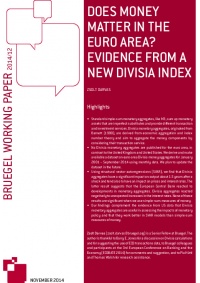Goldstein, M. (2014) “The 2014 EU-wide bank stress test lacks credibility“, VoxEU Organisation, 18 Νοεμβρίου. Results from last month’s EU-wide stress test are reassuring, especially for countries at Europe’s core. This column warns against a rosy interpretation. The test relies on risk-weighted measures of bank capital ratios that have been shown to be less predictive of bank failure than unweighted leverage ratios – a metric already adopted by the …Read More
Europe’s Bonds Are Unyielding
Gilbert, M. (2014) “Europe’s Bonds Are Unyielding“, Bloomberg View–European Economy, 14 Νοεμβρίου. With central bank interest rates at or near zero in many parts of the world, borrowing costs for governments and companies have plunged to record lows. In Europe, corporate bond yields are now so low that it’s hard to see how fixed-income investors will be able to make money. It’s also difficult to imagine that yet more cheap …Read More
Germany’s Secret Credit Addiction
Turner, A. (2014) “Germany’s Secret Credit Addiction“, Project Syndicate, 10 Νοεμβρίου. With recent data showing that German exports fell 5.8% from July to August, and that industrial production shrank by 4%, it has become clear that the country’s unsustainable credit-fueled expansion is ending. But frugal Germans typically do not see it that way. After all, German household and company debt has fallen as a share of GDP for 15 …Read More
Recent slowdown in global trade: Cyclical or structural
Boz, Ε., Bussière, Μ. & Marsilli, C. (2014) “Recent slowdown in global trade: Cyclical or structural“, VoxEU Organisation, 12 Νοεμβρίου. The past three years have witnessed a slowdown in global trade. This column shows that the slowdown was particularly pronounced in advanced economies, especially the Eurozone. In a panel of 18 OECD economies, most of the slowdown can be explained by cyclical factors. However, structural factors – global …Read More
Contagion in the European sovereign debt crisis
Glover, B. & Richards-Shubik, S. (2014) “Contagion in the European sovereign debt crisis“, VoxEU Organisation, 12 Νοεμβρίου. Understanding the probability and magnitude of financial contagion is essential for policymaking. This column applies a framework for modelling financial contagion to data on the cross-holding and credit risk of sovereign debt in Europe. Credit markets perceived little risk of contagion from these spillovers following a sovereign default. It is important for …Read More
What caused the great recession in the Eurozone? What could have avoided it?
Martin, P. & Philippon, T. (2014) “What caused the great recession in the Eurozone? What could have avoided it?“, VoxEU Organisation, 11 Νοεμβρίου. Economists disagree over the origin of the Eurozone Crisis. This column uses a quantitative framework to sort through the various channels and policy impacts. It argues that fiscal and macroprudential policies are complements, not substitutes. Prudent fiscal policy is helpful but cannot by itself undo private …Read More
Quantitative Easing for the People
Muellbauer, J. (2014) “Quantitative Easing for the People“, Project Syndicate, 05 Νοεμβρίου. It is now a near certainty that, by the end of this year, falling energy and commodity prices will push annual inflation in the Eurozone below zero – well under the European Central Bank’s target of near 2%. Rather than continue to allow misguided conventional thinking, centered on German economic ideology, to impede effective action, the ECB …Read More
Does Money Matter in the Euro area? Evidence from a new Divisia Index
Darvas, Ζ. (2014) “Does Money Matter in the Euro area? Evidence from a new Divisia Index“, Bruegel Working Paper 2014/12, 06 Νοεμβρίου. The purpose of this paper is to examine the possible role of money shocks on output and prices in the euro area. Since no Divisia monetary aggregates are available for the euro area, we first create and make available a database on euro-area Divisia monetary aggregates. We …Read More
Any hope that a revival of Spain’s housing market could help kick-start the country’s economy is likely to prove misplaced
Montalvo, J.G. (2014) “Any hope that a revival of Spain’s housing market could help kick-start the country’s economy is likely to prove misplaced“, LSE EUROPP, 06 Νοεμβρίου. Recent months have seen house prices in Spain rise for the first time in six years, after the housing sector was badly hit by the financial crisis. José García writes that one of the most damaging aspects of the crisis in Spain …Read More
What’s Bad for Germany Could Be Good for Europe
The Editors (2014) “What’s Bad for Germany Could Be Good for Europe“, Bloomberg View, 04 Noεμβρίου. Even those familiar with Europe’s plight will find the latest economic forecasts grim reading. You thought the outlook for the euro area was bad already. It’s getting worse, says the European Commission. That said, Europe works in mysterious ways. In this deepening pessimism, there might just be grounds for optimism. The projections make …Read More





